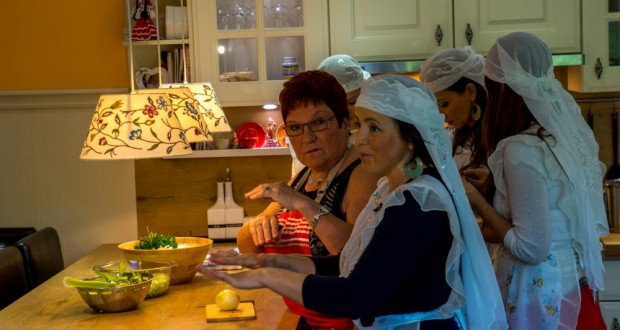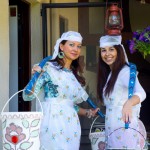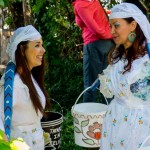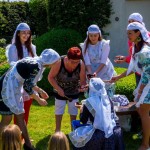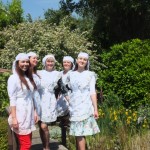The master-class on the national cuisine was given by Flemish women to Tatar women of Belgium. It covered professional study of cooking techniques on the most popular dish in this country, which is Belgian mussels and Belgian fries. “Tatars in Belgium” expressed their desire to learn culinary skills, showing respect for tradition and custom of local cuisine. Visiting Belgian Tatars at that time was the crew of the TNV New Age channel from Tatarstan.
It is noteworthy that while asking a traveler about his experiences of the trip, one of the first questions that pops up is about authentic cuisine of the country visited, in order to understand the nature of the country. As the Tatar proverb says “keshene rizyk yortǝ” (food carries person around). Story of how Belgians are preparing their classic dishes and why they are so popular among the local population was being translated to the audience of TNV channel.
Belgium, especially its Flemish region, that once was part of the Netherlands, is very similar through its climatic conditions, has the same emphasis in agricultural technique, especially technologically disciplined they are engaged in potato harvesting. In the 16th century Belgians popularised deep fried potato chips and until these days it is still considered to be the best. “French fries”, as it is called in English, contrary to popular belief, is not translated as “French style fried potatoes,” but refers to the chopping technique called “frenching” – cutting in the thin stripes.
Size and origin of mussels also plays an important role on the taste of the dish: preferred size is around 40 pieces that equals to one kilogram, as opposed to small, where the same kilogram accounted for 60 pieces. The main task while cooking mussels as explained by the Belgian chef Annie De Coorde is to coordinate for the mussels to open their inner valves before diving into the thermal treatment. She demonstrated how in 8-minute they opened up. Before putting them into the pan with spices, mussels were thoroughly washed with fresh artesian water, which was supplied by Tatar girls. Annie De Coorde who was invited for this event, is a kook with more than thirty-five years of experience, almost all her life she cooked for employees of the Royal Meteorologic station, astronauts and the King of Belgium himself. According to her, the Belgian cuisine is plant-based, due to the cultivating history of the kingdom. Nowdays farmers are still in favour. Their farming land can be found not only the village areas, but also in the cities and even in downtown Brussels.
Tatars of Belgium had repeatedly given kook workshops to Flemish women. It was primarily related to the techniques of traditional cooking such as Tatar noodles or Tatar dumplings, and of course, the famous chak-chak. According to the leader of “Tatars in Belgium” Regina Valeeva, Belgians inquire about Tatar cuisine with a great interest, learning exotic culture of Tatars through the culinary discoveries.

